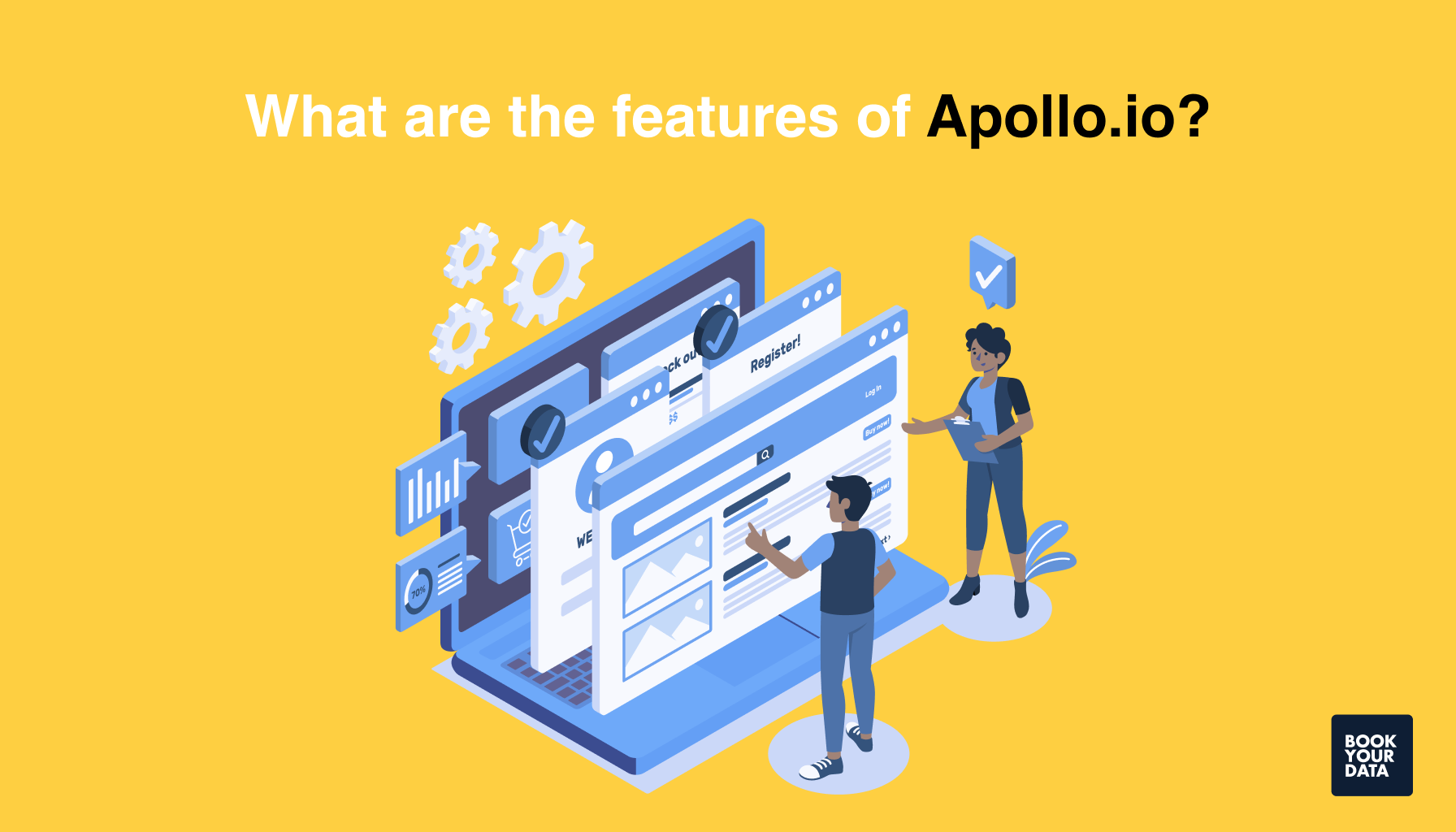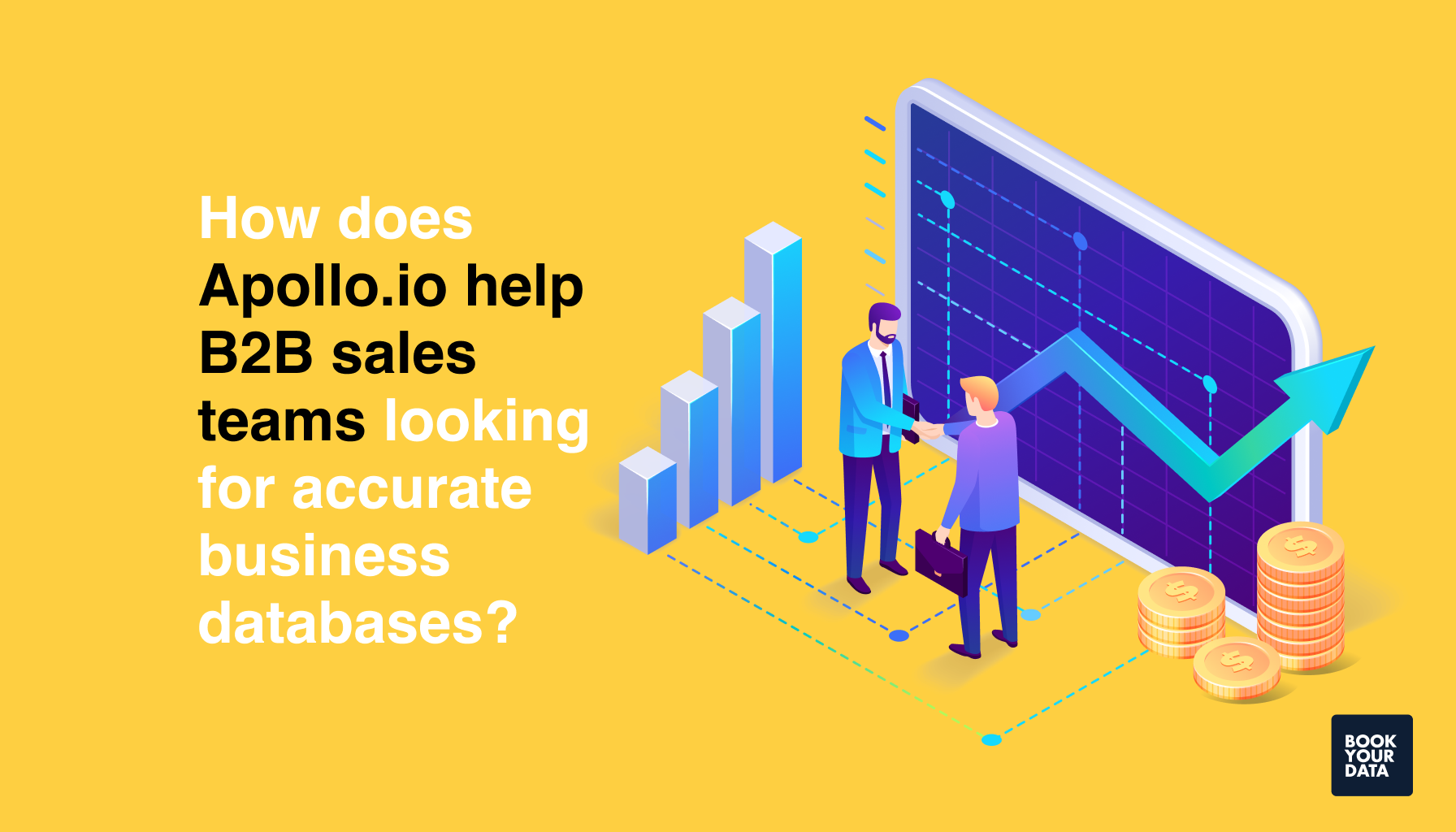Apollo.io: Definition, Uses, Features, Pricing, Pros, Cons, and Alternatives
Apollo.io is a popular B2B sales intelligence platform that helps businesses find important contacts and connect with potential customers. It’s mainly used by sales teams, marketers, and recruiters to find high-quality leads, send emails, and manage outreach campaigns. The main purpose of Apollo.io is to help businesses grow by turning leads into customers faster and more effectively.
Apollo.io has gained popularity as it offers lead generation, outreach, and analytics all in one platform. It has a large database and effective search methods that help it stand out and be a more reliable option.
Some of the key features of Apollo.io include an extensive contact database, sales engagement tools, a Chrome extension, AI-powered insights and automation, integrations, data enrichment, campaign analytics, and customizable workflows.
Popular alternatives to Apollo.io include Bookyourdata, Zoominfo, Saleshandy, and Lusha.
What is Apollo.io?

Apollo.io is a cloud-based sales automation and intelligence tool that helps businesses find and contact potential customers. Apollo.io offers a powerful database of millions of verified business contacts, which allows users to search for leads using detailed filters like job title, location, company size, and industry.
It also includes tools for email outreach, automated sequences, call tracking, and performance analytics, and is mainly built for sales professionals, marketers, and business development teams who need to reach out to new prospects and boost their conversion rates.
⚠️ Important Context: In early 2025, Apollo.io’s LinkedIn company page was delisted due to reported violations of LinkedIn’s platform policies, specifically regarding data usage practices. Although Apollo.io’s services continue to operate, this development has led some users and industry observers to question the platform’s alignment with long-term compliance standards. Businesses evaluating Apollo should take this into account when considering tools that rely on third-party data environments for lead generation.
What are the uses of Apollo.io?
The uses of Apollo.io are lead generation, sales, and marketing automation, valuable insights, CRM integration, and performance tracking.
These uses are described below.
- Lead generation: Lead generation means that Apollo.io helps businesses find potential clients and strong leads by scanning its massive B2B database, which includes verified contact details from sources like LinkedIn. It even allows users to apply filters like job title, location, or industry to find more accurate results.
- Sales and marketing automation: Sales and marketing automation means that Apollo.io can automatically perform tasks like reaching out through emails, conducting follow-ups, and making important sales calls. This helps businesses save time and increases the efficiency of the outreach process.
- Valuable insights: Valuable insights mean that Apollo.io provides deep information like company size, revenue, job function, and tech stack. These detailed sets of information help businesses better understand their prospects and then customize their outreach and messaging accordingly.
- CRM integration: CRM integration means that Apollo.io can effortlessly combine with popular CRM tools like Salesforce, HubSpot, and Zoho. This allows all contact data, emails, calls, and lead activity to work properly with CRM tools without much manual work.
- Performance tracking: Performance tracking means that Apollo.io offers deep analytics that show how your email campaigns and sales outreach are performing. This allows you to track information like email open rates, click-through rates, response rates, and call outcomes.
What are the features of Apollo.io?

The features of Apollo.io are an extensive contact database, sales engagement tools, a Chrome extension, AI-powered insights and automation, integrations, data enrichment, campaign analytics, and customizable workflows.
📌 New video review: Watch how Bookyourdata compares to Apollo.io—see the differences for yourself.
These features are described below.
Extensive contact database
An Extensive contact database means that Apollo.io offers access to a large database of over 265 million verified contacts across various industries. It even allows users to search through the database more accurately by applying filters like job title, company size, location, and more to find ideal prospects.
This feature allows sales teams to find accurate contacts more efficiently, build highly targeted lists, and make the outreach process more precise. For example, a startup company targeting HR managers across other industries can easily build a targeted email list quickly using Apollo’s filters.
Sales engagement tools
Sales engagement tools refer to the effective tools provided by Apollo.io, like email finder, sales automation, and AI-supported messaging. These tools help the sales representatives in a business to manage their campaigns and workflow more efficiently and find high-quality leads.
It also offers AI-driven suggestions for email content, which can improve engagement rates. For example, a sales representative can set up an email sequence for new leads and receive alerts when someone opens or replies.
Chrome extension
Chrome extension means that Apollo.io offers an extension that is built into Chrome, which can easily integrate its data and engagement tools directly into the user's browser. This allows sales representatives to get important information conveniently and take advantage of Apollo’s features while working on LinkedIn, Gmail, or Google Calendar.
The Apollo Chrome extension can save valuable time and effort as users can quickly gain information while they are browsing the web normally. For example, a recruiter in a company can instantly get the contact information of potential employees while browsing their profiles on LinkedIn.
AI-powered insights and automation
AI-powered insights and automation mean that Apollo.io uses artificial intelligence to enhance sales strategies by providing insights into the best prospects and accurate contact leads, ensuring that users conduct effective messaging and proper outreach.
The AI provided by Apollo also assists in lead scoring, which helps teams prioritize prospects that are more likely to convert to actual clients. For example, if a user sends an email campaign and one version gets more replies, Apollo can suggest using that version more often.
Integrations
Integrations mean that Apollo.io can seamlessly work and combine with various CRM tools like Salesforce, HubSpot, Gmail, LinkedIn, and Zapier. These integrations help users keep everything in one place, so the teams don’t have to switch between tools or copy and paste data manually.
These integrations also avoid duplicate data entry and keep sales records up-to-date across all systems. For example, if you find a new lead in Apollo, it can automatically appear in your CRM with all their details, saving your team time and reducing mistakes.
Data enrichment
Data enrichment means that Apollo.io can enhance or update the information you already have about your contacts. It can add extra valuable details like job role, company revenue, number of employees, technology used, and more.
This helps sales representatives gain more insights into their leads and write more personalized messages to target the offers more effectively. For example, if a user only has a lead’s email, Apollo can find their company info, job title, or social media profiles.
Campaign analytics
Campaign analytics means that Apollo.io gives you helpful reports to show how your email and sales campaigns are doing. These reports include things like how many people opened your emails, clicked on links, replied, or if the emails bounced back.
This information helps you understand what’s working and what needs to be fixed. For example, if your emails are being opened but not getting replies, it might mean your outreach messages are not strong or customized enough.
Customizable workflows
Customizable workflows mean that Apollo.io allows users to set up automatic workflows to save time and ensure that they reach out to all leads. This is done by conducting step-by-step processes that run automatically based on your actions or your lead’s behavior.
These smart workflows can help companies save valuable time and help the teams move faster and more effectively. For example, when someone clicks on a link in your email, Apollo can automatically tag them as “interested” and assign a follow-up task to a team member.
What are the pricing plans for Apollo.io?
The pricing plans for Apollo.io include the free plan, basic plan, professional plan, and organization plan.
These Apollo pricing plans are described below.
- Free plan: The free plan is best for individuals or startups as it costs $0 and offers up to 60 email credits per month, two basic email sequences, and access to Apollo’s Chrome and LinkedIn extensions. You can send up to 250 emails a day using a Gmail account.
- Basic plan: The basic plan costs $49 per user per month if paid yearly and is ideal for small but growing sales teams. It includes 900 mobile credits, 30,000 export credits, data enrichment tools, and better search filters. It provides the ability to select up to 10,000 records at a time, which increases the scale of your sales outreach.
- Professional plan: The professional plan costs $79 per user per month if paid yearly and is best for businesses that need more control and advanced tools. It offers 48,000 export credits and includes helpful features like A/B testing, AI email writing, call recordings, and a built-in dialer.
- Organization plan: The organization plan costs $119 per user per month and is best for large companies that need advanced customization and support. It includes everything in the Professional plan and additional features like custom reporting, API access, Single Sign-On (SSO), and priority customer support. It also offers 72,000 export credits and powerful team-wide controls.
What are the pros of Apollo.io?

The pros of Apollo.io are no email send list, affordable pricing, a good database of emails, advanced search filters, and compliance features.
These pros are described below.
- No email send list: No email send list means that Apollo provides a large collection of verified contacts, so users don’t have to bring their own email lists. This saves a lot of effort and makes it easy to start outreach right away.
- Affordable Pricing: Affordable pricing means Apollo.io provides great features without being expensive, making it great for startups and small businesses. It has a free plan and lower-cost options compared to other tools.
- Good database of emails: a good database of emails means that Apollo.io offers access to more than 275 million verified email addresses and detailed company data from 35 million businesses, helping you find leads across almost every industry.
- Advanced search filters: Advanced search filters mean that Apollo offers more than 65 filters that users can take advantage of to easily find their ideal leads based on job title, company size, industry, location, and more.
- Compliance features: Compliance features mean that Apollo.io includes built-in tools to stay compliant with data protection laws like GDPR and CCPA, helping you avoid legal risks when contacting leads.
What are the cons of Apollo.io?
The cons of Apollo.io are data security issues, limited customer support, a steep learning curve, and occasional data inaccuracy.
These cons are described below.
- Data security issues: Data security issues mean that some users raise concerns about how their data is collected, stored, and used, even though Apollo.io is GDPR and CCPA-compliant. Since the platform deals with large amounts of personal and business data, users don't receive extra assurance that their information is secure.
- Limited customer support: Limited customer support means that Users on the free or lower-cost plans may experience slow customer service. If you run into any problem while using Apollo.io, you might not get quick help unless you have a higher subscription plan.
- Steep learning curve: Steep learning curve means that Apollo.io has a lot of powerful tools, which can be confusing for many users when they join. New users or smaller teams might need a long time to understand how to use all the features properly, especially things like automation, filters, and analytics.
- Occasional data inaccuracy: Occasional data inaccuracy means some contact information, like emails or job titles, might be inaccurate or outdated, even though Apollo.io updates the database regularly. This can lead to bounced emails or reaching the wrong people, which wastes time and effort.
Bookyourdata is the best Apollo.io alternative

Bookyourdata is the best alternative to Apollo.io if you are looking for a faster, more flexible, and verified contact data solution. Bookyourdata provides users with easy-to-download, pre-verified email lists with custom filtering, while Apollo.io only focuses on delivering contacts from its database.
It is best for B2B sales, recruitment, and marketing as it helps skip the process of searching for professionals and takes you straight to the target and allowing you to start the outreach campaign immediately.

Features
- Shows downloadable B2B email lists with custom filters.
- Provides real-time email verification and deliverability guarantee.
- Allows direct CRM and marketing tool integrations.
- Allows search filters like industry, job title, location, company size, and more.
- Fully web-based, so no need for browser extensions.
- Clean and GDPR-compliant datasets.

Pricing
- Pay-as-you-go model: Starts from $99 and offers $0.40 per contact.
- Prepaid credits: The per-contact price can be reduced depending on how many credits you purchase.
More alternatives to Apollo.io
The more alternatives to Apollo.io are Zoominfo, Saleshandy, and Lusha.
Zoominfo
ZoomInfo is a B2B contact database and sales intelligence platform that offers deep company insights, verified leads, and tools for targeting the right decision-makers. It provides users with one of the largest verified contact databases and tools that support deep segmentation and intent-based targeting.
Features
- Provides access to over 235 million professional contacts and 100 million company profiles.
- Offers intent data and buying signals to help identify sales-ready prospects.
- Allows advanced segmentation with firmographics, technographics, and behavioral filters.
- Integrates with CRMs like Salesforce, HubSpot, and outreach platforms.
Pricing
ZoomInfo only offers customized pricing based on the features that a business needs. They provide different packages that can be customized for sales, marketing, and recruitment teams.
Saleshandy
Saleshandy is an email outreach platform that focuses on cold email automation, email tracking, and personalized campaign management. It is ideal for sales teams that want to boost response rates and engagement.
Features
- Offers A/B testing for subject lines and templates to improve conversions.
- Supports unlimited email accounts and auto-follow-up sequences.
- Provides detailed analytics and campaign-level reporting dashboards.
- Seamlessly integrates with Gmail, Outlook, and CRMs like Pipedrive and Zoho.
Pricing
- Outreach Starter: Costs $25 per user per month if billed annually and offers 100 lead finder credits.
- Outreach Pro: Costs $7 per user per month if billed annually and offers 500 lead finder credits.
- Outreach Scale: Costs $149 per user per month if billed annually and offers 1,000 lead finder credits.
- Outreach Scale Plus 100k: Costs $211 per month per user if billed annually and offers everything in the regular outreach scale plan, along with additional emails and active prospects.
Lusha
Lusha is a B2B data provider that offers accurate contact details and provides seamless integration with CRMs. Its quick contact-finding and efficient prospecting capabilities make it a popular tool for LinkedIn-based prospecting.
Features
- Offers a Chrome extension that reveals contact data on LinkedIn and company websites.
- Provides access to millions of verified B2B email addresses and direct dials.
- Includes real-time enrichment for inbound leads via forms or CRMs.
- Allows team collaboration features like shared lists and tags.
Pricing
- Free Plan: Starts at $0/month with limited features and 70 credits.
- Pro: Starts at $22.45/month with a minimum of 3,600 credits.
- Premium: Starts at $52.45/month with a minimum of 9,600 credits.
- Scale: Custom pricing based on team size.
How does Apollo.io help B2B sales teams looking for accurate business databases?

Apollo.io helps B2B sales teams looking for accurate business databases by providing them access to a large and verified database of over 275 million contacts and 73 million companies. This allows them to find relevant contacts by filtering and then connecting with the right prospects efficiently.
It is a powerful all-in-one sales intelligence platform that can help businesses solve any problem related to B2B sales and find accurate and targeted contact information. Its database includes verified business emails, phone numbers, job titles, industries, and company insights, which are regularly updated to maintain accuracy.
How does Apollo.io's data accuracy compare to other B2B databases like ZoomInfo and UpLead?
Apollo.io’s data accuracy is strong, but it is also slightly behind other B2B databases like ZoomInfo and UpLead. Apollo.io offers a large database that is regularly updated, but ZoomInfo is more accurate as it uses AI-powered verification and updates, and UpLead is popular for its 95% data accuracy guarantee with real-time email verification.
Is Bookyourdata a better alternative to Apollo.io for bulk contact lists?
Yes, Bookyourdata is better for purchasing bulk contact lists that are ready to download instantly. Even though Apollo.io is stronger in lead generation and outreach tools, it does not offer the ability to create and download bulk contact lists.

What are the key differences between Apollo.io and BookYourData in terms of pricing and data quality?
The key differences between Apollo.io and Bookyourdata in terms of pricing and quality are significant. When it comes to BookYourData vs Apollo, Apollo.io uses a subscription-based model with tiered pricing for different data types, such as mobile numbers, while BookYourData follows a transparent pay-as-you-go system where 1 credit equals 1 contact. Bookyourdata also focuses on real-time verified contacts with a 97% email deliverability guarantee, while Apollo offers access to a larger database that may include outdated contact information.
What is the difference between ZoomInfo and Apollo?
ZoomInfo offers more accurate data that is ideal for large businesses that can’t take huge risks, and it also provides deep market insights, but it is much more expensive. Apollo is more affordable, with solid data and strong sales engagement tools.
Is Hunter.io better than Apollo.io for email finding and verification?
Yes, Hunter.io is better than Apollo.io for email finding and verification, as it is more accurate and specialized. Apollo.io offers a broader toolset that includes email search but focuses more on sales automation and outreach.
Does Apollo.io qualify as a market intelligence tool for B2B marketing?
Yes, Apollo.io does qualify as a basic market intelligence tool as it provides insights like firmographics, technographics, and intent data, but it lacks deep analytics and competitor insights found in full-scale market intelligence platforms.
[CTA1]
[CTA2]











